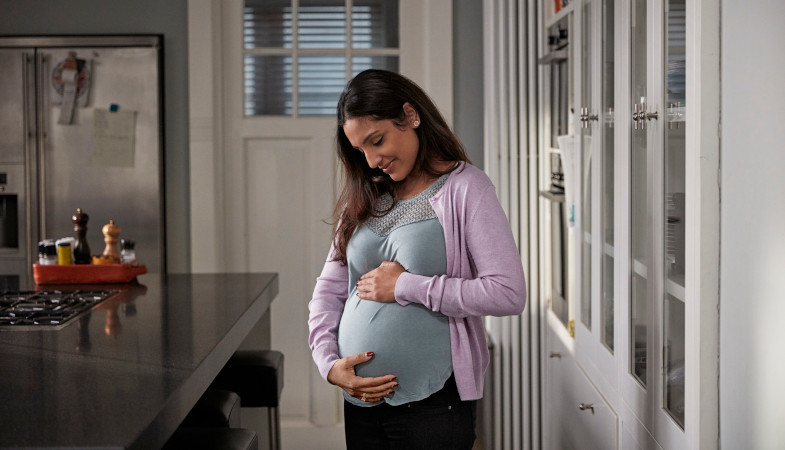The Different Stages of Pregnancy

Finding out you are pregnant is a lifechanging moment. As a new life begins, your body will undergo a number of large changes, which is totally natural. The next nine months or so can be a hugely exciting, yet sometimes worrisome time for would-be mothers.
However, with a little preparation, you can be best placed to enjoy the experience of your baby’s growth and focus more on the positive aspects of your journey towards motherhood.
The nine months of pregnancy are usually divided into three distinct stages, called trimesters. During these periods, your baby is developing at different rates and, as a result, your body will be affected in a variety of ways.
Many future mothers have questions around what to expect from these trimester periods and how best to prepare. We’ve put together this guide to help you understand each stage of development, both for you and your baby, to help make the journey a little easier.
What to expect in your first trimester
The initial 12 weeks after conception are considered the first trimester period. Over this time, your body will undergo some of the biggest changes as your baby begins to grow. Though you can expect a lot to happen, it’s perfectly normal and isn’t anything to be concerned about.
At this stage, your baby is changing from a fertilised egg, to an embryo and then to a foetus. Their organs are beginning to form, along with their tiny limbs. At around eight weeks, the doctor will be able to detect a tiny heartbeat and reproductive organs will begin to form, dictating your child’s sex.
Symptoms and changes
Your baby is changing, and you can expect to undergo changes yourself as your body adjusts to a little person growing inside you. These can include1:
Extreme fatigue
Nausea and vomiting (commonly known as morning sickness)
Cravings for certain foods and flavours
Mood swings
Swollen, tender breasts
Headaches
Heartburn
Fluctuations in weight
Frequent urination
Every woman is different, of course, and some may experience symptoms that others do not. You can help minimise the impact of these symptoms by ensuring you are getting the right nutrients and vitamins through a varied, balanced diet - and taking enough time to rest during these few months.
What to expect in your second trimester
The second trimester typically lasts from 13 to 28 weeks2. Some women say that this next stage is easier than the first few months, though every mother-to-be will have their own experiences. The biggest change you’ll likely notice is the appearance of a ‘baby bump’.
The size of your baby bump will differ, depending on the size and growth stage of your little one. Over these twelve weeks, you may even begin to feel little kicks and movement, as your child begins to form muscles and develops control over their growing limbs.
Throughout this time, your baby will continue to develop at an ever-faster rate than in the initial twelve weeks. Musculoskeletal systems, intestines and skin begin to form, as well as your baby becoming increasingly active in the womb. At this stage, your baby will also be able to hear for the first time, so it’s a good time to start talking to them.
At around 12 weeks, the doctor will be able to tell you what gender your child is. You can share the great news with your family and friends, keep it to yourself and your partner, or even keep it a surprise for everyone.
Symptoms and changes
Some women experience a range of symptoms and changes in their body during this second trimester stage, including3:
Muscular pain, especially in the back, groin and abdomen area
Stretch marks and darkening of the skin on the torso and groin
[Darkening of the skin](/prenancy skincare) on the hands and face
Numb or tingling sensations in the hands
Slight swelling of ankles, fingers and face
Mild to moderate itchiness
If you experience more extreme symptoms, including nausea, yellowing of the skin or loss of appetite, it’s vital that you speak to your doctor, as these can be a sign of liver problems.
What to expect in your third trimester
As you enter the final stages of pregnancy, called the third trimester, your baby is nearing their due date. Throughout this stage, your little one is quickly gaining weight and size. A full skeleton begins to form, and organs begin to function on their own as their body prepares to become independent. Your baby is almost ready to be born.
It can be helpful at this time for both parents to join clubs and classes focused around pregnancy and getting ready for the baby’s arrival. These don’t all have to be educational antenatal classes either. There are plenty of pregnancy yoga and light fitness classes available to would-be mothers that can help strengthen your body ahead of giving birth.
Symptoms and changes
The final stages of pregnancy can be tough, but rest assured, many of these changes and experiences will go away naturally once you’ve given birth4:
Swelling of ankles, fingers and face (contact your doctor straight away if you notice sudden or extreme swelling, which could be a sign of pre-eclampsia)
Heartburn
Shortness of breath
Tender, sometimes leaky breasts
Haemorrhoids
Contractions (these can be a sign of real or false labour)
How to prepare for labour
There are many ways to prepare for labour. It helps to do a little research beforehand, so you can get a general idea of what to expect.
Of course, every birth is different. Even the most thorough research strategy won’t necessarily ready you for your own birth. However, there are plenty of online resources around good birthing positions, breathing techniques and relaxation tips online. Plus, you can always speak with your doctor or midwife about the process for more advice.
It’s worth packing a hospital bag and having it ready to go when the time comes. The last thing you’ll want to be doing is running around the house throwing things in a bag when the baby is on the way. Here are a few essentials you should consider:
Your birth plan and maternity notes
A warm dressing gown
Slippers or comfortable shoes
T-Shirts that you don’t mind getting a little messy
Warm socks
Toiletries, including moisturiser, toothbrush and paste and lip balm
High-energy snacks and drinks
Hairbands
Nappies, blanket and clothes for your baby to wear
Spare clothes for leaving the hospital
Pregnancy can be daunting, but also exciting. With a little research and forward planning, you can be best placed to make the most of the next nine months before your bundle of joy arrives.
Discover more top tips and helpful hints to guide you through pregnancy, your baby’s early stages and more with JOHNSON’S® Baby.
1 https://www.nhs.uk/start4life/pregnancy/week-by-week/1st-trimester/week-four/
2 https://www.onhealth.com/content/1/pregnancy_stages_trimesters
3 https://www.nhs.uk/start4life/pregnancy/week-by-week/2nd-trimester/week-thirteen/
4 https://www.nhs.uk/start4life/pregnancy/week-by-week/3rd-trimester/week-twenty-eight/
